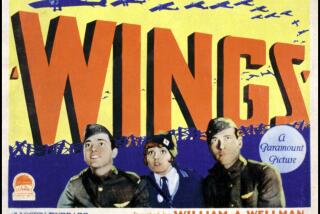‘It Happened One Night’ overcame tough odds to become a classic
Frank Capra’s sexy and witty “It Happened One Night” from 1934 is not only the quintessential romantic comedy but the romp was also the first film to win Academy Awards for picture, director, actor, actress and adapted screenplay. It would take 41 years for another film, “One Flew Over the Cuckoo’s Nest,” to equal that Oscar sweep.
Adapted by Robert Riskin from a short story called “Night Bus,” the breezy comedy revolves around the unlikely romance between a spoiled socialite (Claudette Colbert) traveling incognito on a bus after running out on her wedding and a down-on-his-luck reporter (Clark Gable) on the hunt for a good story.
“It Happened One Night” was so popular that sales of men’s undershirts were said to have gone into decline after the scene — considered racy at the time — in which Gable takes off his shirt in front of Colbert and reveals his bare chest.
The film’s success not only changed the careers of the filmmakers and stars but also put Harry Cohn’s “Poverty Row” Columbia Pictures on the map.
“This is the rare case where one picture really made a studio,” said Michael Schlesinger, a former Sony executive and classic film comedy expert. “Columbia was a B picture studio,” he said. “They made maybe one or two comedies a year. They had gotten a taste of Oscar glory a year before when Capra’s ‘Lady for a Day” got four nominations but won none. So for ‘It Happened One Night’ to come out of nowhere and sweep like this was unprecedented.”
Despite its legacy, the odds were stacked against “It Happened One Night.”
Because of its Poverty Row reputation — a term used in early Hollywood to describe studios turning out low-budget, low-grade films — actors who were under contract to top-tier studios such as MGM and Paramount didn’t want to be lent out to Columbia. Robert Montgomery turned down “It Happened One Night.” So did Myrna Loy. Several other actors and actresses passed on roles or had conflicts with other movies.
TIMELINE: The Academy Awards through the years
For years, Hollywood lore stated that MGM’s Louis B. Mayer lent Gable to Columbia for the film as punishment for being a “bad boy” — the actor’s star was on the rise, and he had asked for more money.
But Schlesinger says the lore is exaggerated. “In Gable’s case, he really wasn’t being punished. Stars were paid a weekly salary whether they were working or not. And in Gable’s case, there was a hole in the schedule and Mayer didn’t want to pay him $2,000 a week for doing nothing. So Mayer gave them Gable for $2,500, and he actually pocketed the extra $500.”
Meanwhile, Colbert, who was under contract to Paramount, was still smarting from working with Capra in 1927 in her first film, “For the Love of Mike,” which was a flop. She demanded a lot of money to do “It Happened One Night,” and surprisingly, Columbia’s Cohn paid her.
Reviews for the film were generally good, but it wasn’t an instant blockbuster. In fact, it played just one week at Radio City Music Hall in New York.
“It was not a huge hit until it went down to the neighborhood theaters,” Schlesinger says.
When the Oscars were presented on Feb. 27, 1935, at the Biltmore Hotel in Los Angeles, Colbert was not among the attendees. She didn’t expect to win, so she was at the railway station waiting to board a train to New York. After the announcement that she had won, academy officials rushed to the station to bring her to the ceremony. By the time she got to the Biltmore, the ceremony in progress was awarding Shirley Temple a juvenile Oscar, so organizers had the curly-headed youngster present Colbert with her best actress trophy. Colbert posed for a few pictures and then headed back to the station, where her train had been held for her.
VIDEO: Highlights from the Envelope Screening Series
Gable was also taken by surprise by his win. “There are too many good actors in this business. But I feel as happy as a kid and a little foolish they picked me,” he said at the ceremony.
After “It Happened One Night,” Columbia began making more comedies and went on to become a well-respected studio. Capra won Academy Awards for directing 1936’s “Mr. Deeds Goes to Town” and 1938’s “You Can’t Take It With You.” And in between those years, director Leo McCarey won the trophy for the studio’s screwball farce “The Awful Truth.”
Years later, Capra told Richard Schickel in “The Men Who Made the Movies”: “We made the picture really quickly — four weeks. We stumbled through, we laughed our way through it. And this goes to show you how much luck and timing and being in the right place at the right time means in show business.”
More to Read
Only good movies
Get the Indie Focus newsletter, Mark Olsen's weekly guide to the world of cinema.
You may occasionally receive promotional content from the Los Angeles Times.







